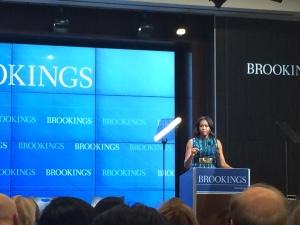
First lady Michelle Obama spoke about the issue of girls’ access to education around the world at the Brookings Institution.
First lady Michelle Obama discussed methods to improve girls’ education worldwide at an event on Friday at the Brookings Institution, which also included two panel discussions featuring former Australian Prime Minister Julia Gillard.
The event, “Mobilizing for Children’s Rights, Supporting Local Leaders and Improving Girls’ Education,” was centered on exploring ways that community organizers and regional reforms could further girls’ education, which has continued to make strides in recent years. Obama noted that, while 56 million more girls attend school now than a decade ago, work toward gender equality in education is only beginning.
“What we’re talking about are the hard things like countless conversations, community meetings. We’re talking about hundreds of hours spent training and empowering local leaders on the ground,” she said. “We’re also talking about a shift in our own thinking so that we see families and communities less as a barrier to girls’ education and more as the source of the solution.”
In her keynote address, the first lady challenged the audience to embrace failure as an opportunity to learn what works and does not work in advancing female adolescent education. She said that if girls in schools around the world can overcome fear and community barriers, leaders in education could overcome logistical barriers to help them.
“Our challenges in doing that are nothing compared to the challenges these girls face, and if we can show just a fraction of their passion and courage and determination then I’m confident that we can give all our girls the education that they deserve. That’s why I’m here,” she said. “I want you all to know that I am committed to this issue. I’m in.”
The first lady’s comments were bookended by two panels, each focused on mobilizing community solutions to the education situation. In the first panel, Gillard echoed a need to engage leaders at the local level in order to address the differing needs of dynamic communities around the globe.
“One of the things I think we always need to do is strengthen the intersection between our local education groups and local leaders because the more grounded that can be in experiences within [countries], the better the answers that are going to be generated,” she said. “It’s never a case of one size fits all.”
Urvashi Sahni, CEO of Study Hall Educational Foundation, an organization that provides education to marginalized Indian children with a focus on girls, said that in many places around the world, gender is a life and death issue and that patriarchal societies should reform their structures to empower young women.
“In a democratic constitution, patriarchal structure has no modern justification whatsoever,” she said. “So let’s look at the social structure, let’s look at patriarchy, let’s look at how power plays itself out in our society…and see how we can make it better. “
Campaign for Female Education Regional Executive Director Angeline Murimirwa recounted her own experience overcoming poverty to receive an education in Zimbabwe. She said that education should not alienate girls from their communities.
“[Education] allows you to become a celebration point for the community and then you start shining,” she said.
In the second panel, moderated by Glamour magazine editor-in-chief Cindi Leive, 17-year-old Namunyana Mwajuma, the youngest panelist, embodied the potential of education. Although her father went missing in 2013, the humanitarian organization CARE, which focuses on fighting global poverty, helped her mother with a savings program that allowed Mwajuma to raise the funds to return to school in Uganda, allowing her to hope of becoming a nurse one day.
“When I went back to school I became happy and excited,” she said. “I gained confidence, knowledge [and] life skills … that have made me who I am today.”




















